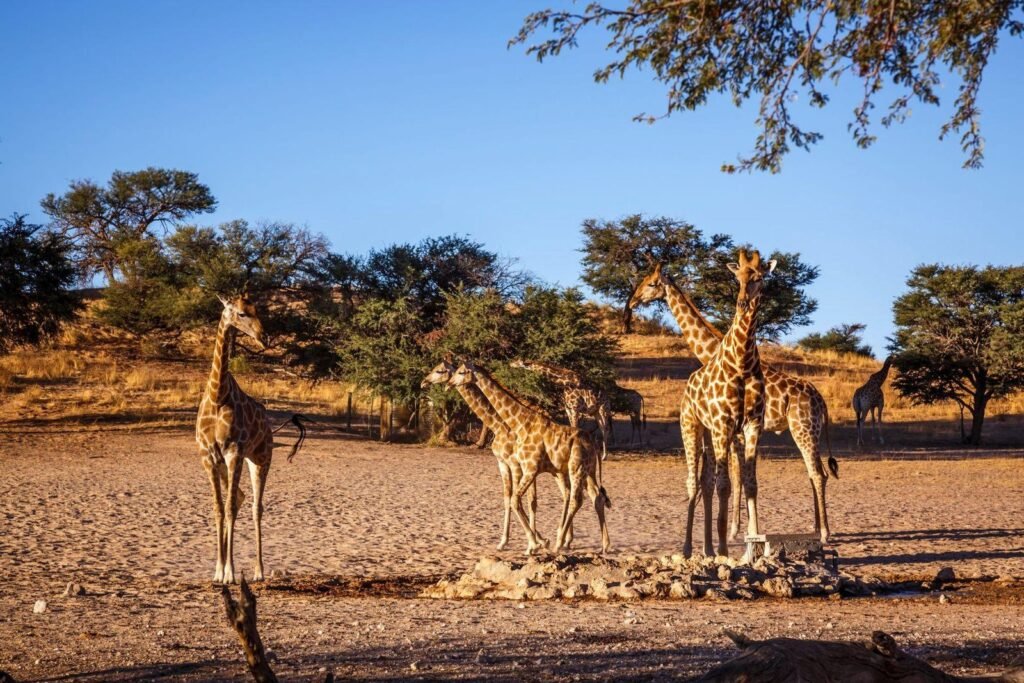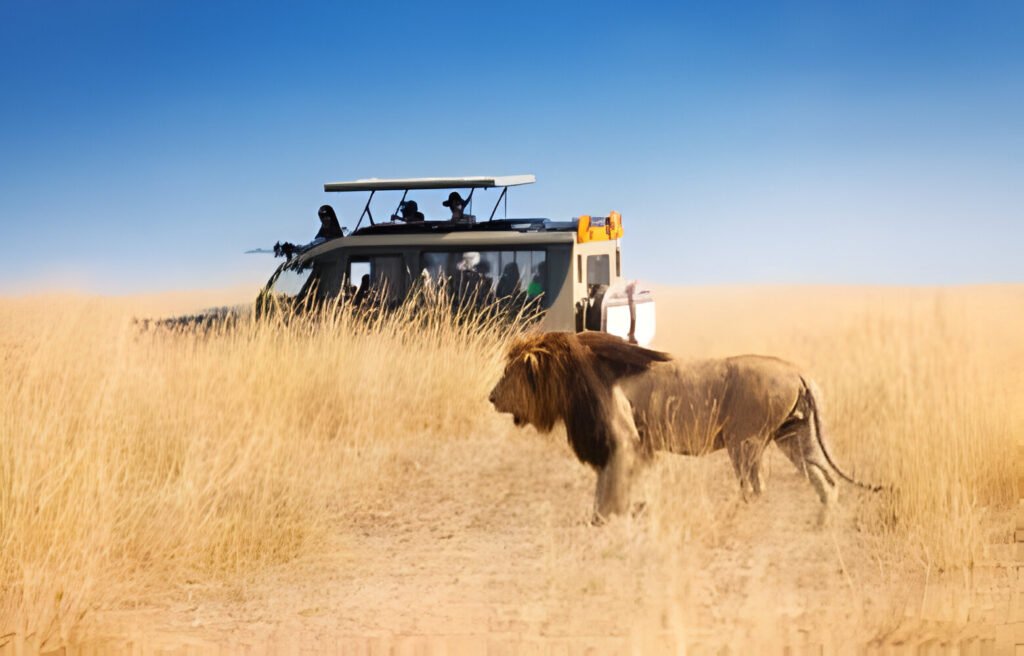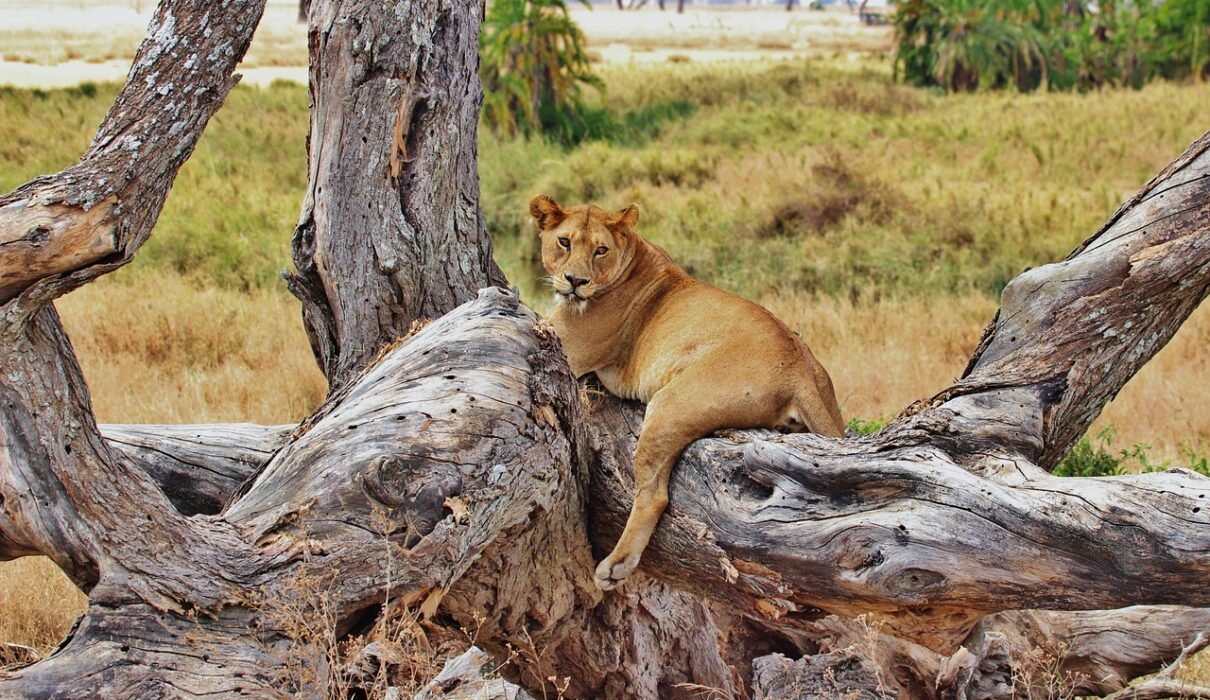How to Book a Sustainable African Safari : Planning an African safari is an exciting adventure, but it’s important to consider the environmental and social impacts of your trip. Booking a sustainable African safari ensures that your journey not only provides a memorable wildlife experience but also supports conservation efforts, local communities, and eco-friendly practices. In this guide, we’ll show you how to book an eco-conscious safari that protects Africa’s rich ecosystems while giving back to the people and wildlife you encounter.
Explore eco-friendly safari options in Tanzania and more.

How to Book a Sustainable African Safari : Choose Eco-Friendly Safari Lodges and Camps
One of the most important steps in booking a sustainable safari is selecting eco-friendly accommodations. Many safari lodges and camps are committed to reducing their environmental footprint through the use of renewable energy, water conservation practices, and sustainable building materials. Look for lodges that prioritize green initiatives and have certifications such as EcoTourism Kenya or Green Key.
Key Features to Look For:
- Solar Power: Look for camps that use solar energy for electricity and hot water.
- Water Conservation: Sustainable lodges often have water-saving systems, such as rainwater collection and water recycling.
- Minimal Footprint: Many eco-lodges are built using sustainable materials and are designed to blend into the natural landscape.
Discover eco-friendly lodges in Tanzania.
How to Book a Sustainable African Safari : Support Conservation-Focused Safari Operators
When booking your safari, choose a tour operator that prioritizes wildlife conservation. These operators often work closely with national parks and reserves to protect endangered species and ecosystems. They may also support anti-poaching initiatives, wildlife monitoring programs, and community-based conservation projects. Sustainable safari companies ensure that a portion of the tour fees goes directly toward conservation efforts.
Why It Matters:
- Wildlife Protection: Your safari can help fund anti-poaching programs and wildlife protection projects.
- Habitat Preservation: Sustainable operators contribute to habitat conservation, ensuring that ecosystems remain intact for future generations.
Book a conservation-focused safari tour.
How to Book a Sustainable African Safari : Choose Safaris That Benefit Local Communities
Sustainable safaris don’t just protect wildlife—they also benefit the local communities who live near national parks and wildlife reserves. Look for safari operators that employ local guides, support community-based tourism projects, and give back to the region through education, healthcare, and economic initiatives. This ensures that the communities benefit directly from tourism and are motivated to continue protecting their natural resources.
How to Identify Responsible Operators:
- Local Employment: Choose operators that employ local guides and staff, providing fair wages and training opportunities.
- Community Partnerships: Many responsible tour companies invest in local schools, clinics, and infrastructure projects.
- Cultural Sensitivity: Sustainable safaris respect the cultural traditions and lifestyles of indigenous communities.
Learn more about community-based tourism in Africa.
How to Book a Sustainable African Safari : Opt for Low-Impact Safari Activities
Traditional safaris involve game drives in 4×4 vehicles, but there are many low-impact alternatives that allow you to experience Africa’s wildlife while reducing your environmental footprint. Consider incorporating walking safaris, canoe safaris, or cycling tours into your itinerary. These activities allow you to explore the wilderness in a more intimate and eco-friendly way while minimizing your carbon emissions.
Eco-Friendly Safari Options:
- Walking Safaris: Explore the bush on foot with a trained guide for a low-impact wildlife experience.
- Canoe Safaris: Paddle through rivers and lakes to observe wildlife up close without disturbing the environment.
- Cycling Tours: Cycle through protected areas, combining adventure with sustainability.
Explore sustainable safari activities.
How to Book a Sustainable African Safari : Limit Plastic Use and Practice Responsible Waste Disposal
Plastic pollution is a growing problem in many African countries, particularly in remote safari areas. When packing for your trip, bring reusable water bottles, food containers, and eco-friendly toiletries to reduce your plastic waste. Additionally, be mindful of waste disposal and ensure that you leave no trace during your safari. Many eco-lodges and tour operators have recycling programs and encourage guests to minimize waste.
Sustainable Travel Tips:
- Reusable Items: Pack reusable bottles, bags, and utensils to avoid single-use plastics.
- Eco-Friendly Products: Choose biodegradable toiletries and sunscreen that won’t harm the environment.
- Responsible Disposal: Follow local guidelines for waste disposal and recycling.
Get tips on reducing plastic waste while traveling.
How to Book a Sustainable African Safari : Travel During the Low Season for Reduced Impact
One of the simplest ways to make your safari more sustainable is by traveling during the low season. High tourist numbers can put a strain on local environments and wildlife. By traveling during off-peak times, you’ll reduce your impact on popular destinations and help spread the benefits of tourism throughout the year.
Benefits of Low-Season Travel:
- Less Crowded Parks: Enjoy a more intimate wildlife experience with fewer tourists.
- Support Year-Round Employment: Traveling during the low season helps sustain local jobs and businesses year-round.
- Lower Prices: Many lodges and tour operators offer discounts during the low season, making your trip more affordable.
Learn more about the benefits of low-season travel.
Offset Your Carbon Footprint
Air travel contributes significantly to carbon emissions, and flying to Africa for your safari will likely be the largest part of your carbon footprint. To make your safari more eco-friendly, consider offsetting your carbon emissions through reputable carbon offset programs. Many airlines and tour operators offer carbon offset options, allowing you to invest in renewable energy projects, reforestation efforts, or other environmental initiatives to balance your carbon output.
How Carbon Offsetting Works:
- Calculate Your Emissions: Use an online carbon calculator to estimate your flight emissions.
- Choose a Reputable Program: Select a certified carbon offset program that invests in sustainable projects.
- Offset Your Trip: Pay for carbon credits equivalent to the amount of CO2 your trip generates.
Explore carbon offset programs for travel.
Respect Wildlife and Nature
While on safari, it’s important to follow the principle of “leave no trace” and treat wildlife with respect. This means keeping a safe distance from animals, following your guide’s instructions, and avoiding any behaviors that could disturb or harm the wildlife. Additionally, make sure to stay on designated paths and avoid damaging vegetation or natural habitats during your safari.
Wildlife Etiquette:
- Keep Your Distance: Don’t approach animals too closely, as this can stress them and alter their natural behavior.
- Stay Quiet: Avoid loud noises or sudden movements that could scare animals.
- No Feeding: Never feed wild animals, as it can disrupt their natural diet and behavior.
Learn more about ethical wildlife tourism.
How to Book a Sustainable African Safari : Educate Yourself Before You Go
Before embarking on your African safari, take the time to learn about the destinations you’ll be visiting, the wildlife you’ll encounter, and the environmental challenges facing the region. Understanding the importance of conservation and community involvement will enhance your appreciation of the experience and inspire you to make responsible travel choices.
Resources for Sustainable Travel:
- Documentaries: Watch wildlife documentaries about African conservation efforts.
- Books: Read up on African ecosystems and the challenges of wildlife protection.
- Conservation Organizations: Follow the work of organizations like the African Wildlife Foundation and WWF.
Discover books and documentaries on African wildlife conservation.

How to Book a Sustainable African Safari : Conclusion
Booking a sustainable African safari is about making mindful choices that protect wildlife, support local communities, and reduce environmental impact. By choosing eco-friendly lodges, supporting conservation efforts, and following responsible travel practices, you can enjoy an unforgettable safari experience while contributing to the preservation of Africa’s incredible natural beauty for future generations.
For personalized eco-friendly safari packages, visit Kilimanjaro Climb Specialist or Eddy Tours & Safaris.

